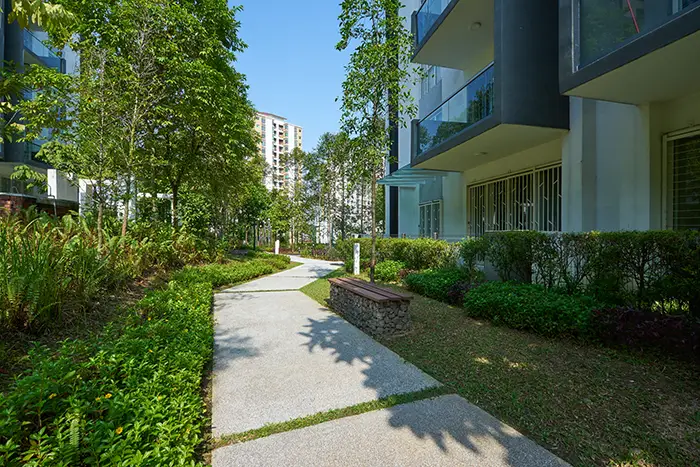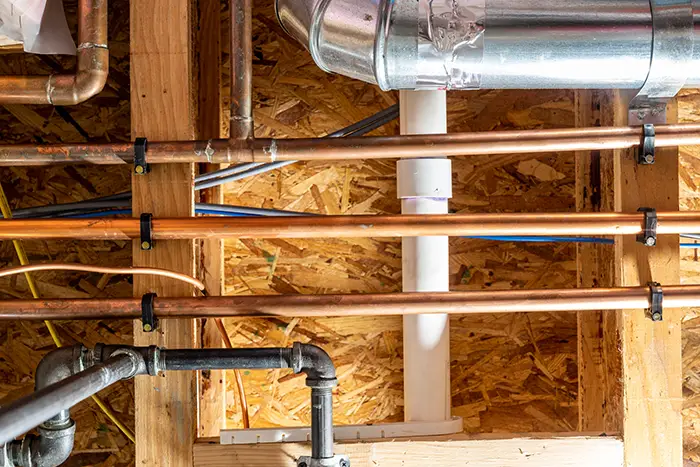HOA: Who Is Responsible For What?
Published on November 16, 2023 | 6 Minute read

Melanie
Ortiz Reyes
Content Specialist
Navigating the world of homeownership often involves more than just finding the perfect house; it's about immersing yourself in the unique community dynamics that come with it. For many homeowners, Homeowners' Associations (HOAs) play a significant role in shaping the living experience. As you embark on the journey of moving into an HOA community, it's crucial to decipher the complexities of maintenance responsibilities – a topic often shrouded in mystery and misconception.
From the manicured lawns to the leaky faucets, understanding who takes charge of what can be the key to a harmonious coexistence within the community. Whether you're a seasoned homeowner familiar with the ins and outs of HOAs or a first-time buyer stepping into the realm of community living, understanding HOA maintenance, shedding light on responsibilities, fees, and the collaborative efforts that keep the community thriving is critical.
The Homeowner's Domain
Within the realm of individual units, the responsibility shifts to the homeowner. This includes the maintenance of everything within the walls of your home, from plumbing and electrical systems to appliances. It's your domain, and issues within this space typically fall under the purview of the homeowner. Understanding this division sets the stage for a clear delineation of responsibilities between homeowners and the HOA.

Green Spaces and Outdoor Duties
When it comes to outdoor spaces, the HOA takes center stage. Common areas such as parks, pools, and community gardens are within the HOA's realm of responsibility. This extends to repairs, landscaping, and general upkeep. Whether it's fixing a broken swing in the playground or ensuring the pool is in pristine condition, the onus is on the HOA to maintain these communal spaces.
On the flip side, your personal outdoor spaces, like your backyard or front porch, fall under your jurisdiction. If your rose bushes need pruning or your deck requires repairs, it's your responsibility to handle these tasks. This separation allows homeowners to have a say in their immediate surroundings while the HOA focuses on maintaining shared outdoor amenities.
Fees and Maintenance Costs
HOA fees often form a significant part of homeownership, and understanding where these funds go is vital. In many cases, a portion of these fees is allocated to the maintenance and repair fund. This fund is earmarked for ongoing maintenance tasks, repairs, and the upkeep of common areas. From fixing a leaky roof to repainting the community clubhouse, these funds play a pivotal role in maintaining the overall integrity of the community.
While HOA fees cover communal expenses, homeowners should be prepared to budget for individual repairs within their units. Appliances wear out, and systems may need upgrading over time. Having a personal repair fund ensures that you can address these issues promptly without relying solely on the HOA's financial pool. Understanding the financial dynamics empowers homeowners to plan for both communal and individual maintenance needs.

Plumbing and Electrical
When it comes to the internal workings of your home, the lines can sometimes blur. Generally, the HOA oversees external elements like the roof and exterior structure. However, when it comes to plumbing, electrical issues, or internal structural problems, it's typically the homeowner's responsibility to get things fixed. Understanding this distinction helps homeowners know when to call in the professionals and when to consult with the HOA.
Effective communication between homeowners and the HOA is crucial in navigating the landscape of repairs. If you're unsure about who is responsible for a particular issue, don't hesitate to reach out to the HOA for guidance. Establishing open lines of communication ensures that repairs are addressed promptly and efficiently, contributing to the overall well-being of the community.
Moving into an HOA Community
When you decide to move into an HOA community, it's important to be aware of the existing maintenance dynamics. Read through the HOA guidelines and familiarize yourself with the rules and regulations. This will give you a clear understanding of what falls under the HOA's purview and what you, as a homeowner, are responsible for maintaining.
Being an active participant in your HOA community can enhance your understanding of the maintenance processes. Attend HOA meetings, ask questions, and stay informed about any upcoming maintenance projects or changes in policies. By actively engaging with your community, you not only contribute to its well-being but also ensure that you are well-informed about ongoing and future maintenance endeavors.
Navigating Disputes
Navigating HOA maintenance disputes can be a challenging aspect of community living, but with a strategic approach, it's possible to find resolution and maintain a harmonious atmosphere. Here are some tips to help you navigate HOA maintenance disputes:
- Understand Guidelines - Familiarize yourself with the HOA guidelines and rules related to maintenance responsibilities. Clear understanding of these rules provides a foundation for your argument and helps you communicate your position more effectively.
- Know Your Rights - Educate yourself about your rights as a homeowner within the HOA. Knowing the extent of your responsibilities and the HOA's obligations empowers you during discussions and ensures that your concerns are addressed appropriately.
- Document the Issue - Before approaching the HOA, document the maintenance issue thoroughly. Take clear pictures, gather any relevant paperwork, and create a detailed record of the problem. Having concrete evidence strengthens your case and provides clarity during discussions.
- Attend HOA Meetings - Actively participate in HOA meetings where maintenance concerns are discussed. This allows you to present your case directly, ask questions, and gain insights into the HOA's decision-making process. It also demonstrates your commitment to finding a solution collaboratively.
- Open Lines of Communication - Initiate a respectful and open dialogue with the HOA. Clearly communicate your concerns, providing the documented evidence you've gathered. Be prepared to listen to their perspective as well. Establishing open lines of communication is key to finding a resolution.
So, if you believe a repair falls under the HOA's responsibility, present your case clearly, providing any relevant documentation. Open a dialogue with the HOA to seek an amicable solution. A collaborative approach ensures that maintenance disputes are addressed efficiently, contributing to a harmonious living environment for everyone involved.
If communication with the HOA proves challenging, consider seeking professional advice. Real estate agents and realtors often have experience in navigating such situations and can provide guidance. Legal advice may be necessary in rare instances, but maintaining open lines of communication and a willingness to find common ground can often prevent disputes from escalating.
Navigating the intricacies of HOA maintenance responsibilities is a crucial aspect of homeownership in community living. By understanding the division of tasks between homeowners and the HOA, budgeting appropriately, and maintaining open communication, you contribute to a thriving and well-maintained community.
